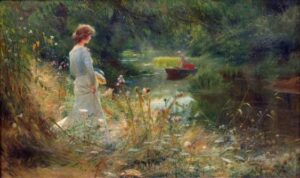The divine sleeps in the rock, breathes in the plant, dreams in the animal, and wakes in man. ~ old Nordic adage
Man is but a reed, the most feeble thing in nature; but he is a thinking reed. The entire universe need not arm itself to crush him. A vapour, a drop of water suffices to kill him. But, if the universe were to crush him, man would still be more noble than that which killed him, because he knows that he dies and the advantage which the universe has over him; the universe knows nothing of this. All our dignity consists, then, in thought. By it we must elevate ourselves, and not by space and time which we cannot fill. Let us endeavour, then, to think well; this is the principle of morality. ~ Blaise Pascal
The thinking vegetable

The secret of life suddenly dawned on Schlegel and he claimed man should live like a vegetable. But which vegetable? Jesus said we should live like the lilies of the field. Blaise Pascal claimed we are more like slender reeds, yet thinking reeds. So just as lilies and tulips bless the earth with their beautiful flowers and scents, the thinking reed blesses the universe with beautiful, creative thoughts.
Non-dual clouds
The sky, from which the sun shines, is the source of life for plants. Our thinking reed witnesses the clouds above, which from time to time blot out the sun in their arising and disappearing. In clouds we can see anything in imagination — whaling ships floating across the sky, angels dancing, all sorts of animals or birds, faces of the gods — which rearrange themselves in new configurations as large clouds break up or smaller clouds combine. We can construct a whole universe of discourse out of the movement of the clouds. Of course, the tulip will create a story different from the lily’s. They may even argue over whose story is truer. Sadly, the may even forget that their real Source is the Sun that shines through the gaps in the clouds.
Leave a Reply